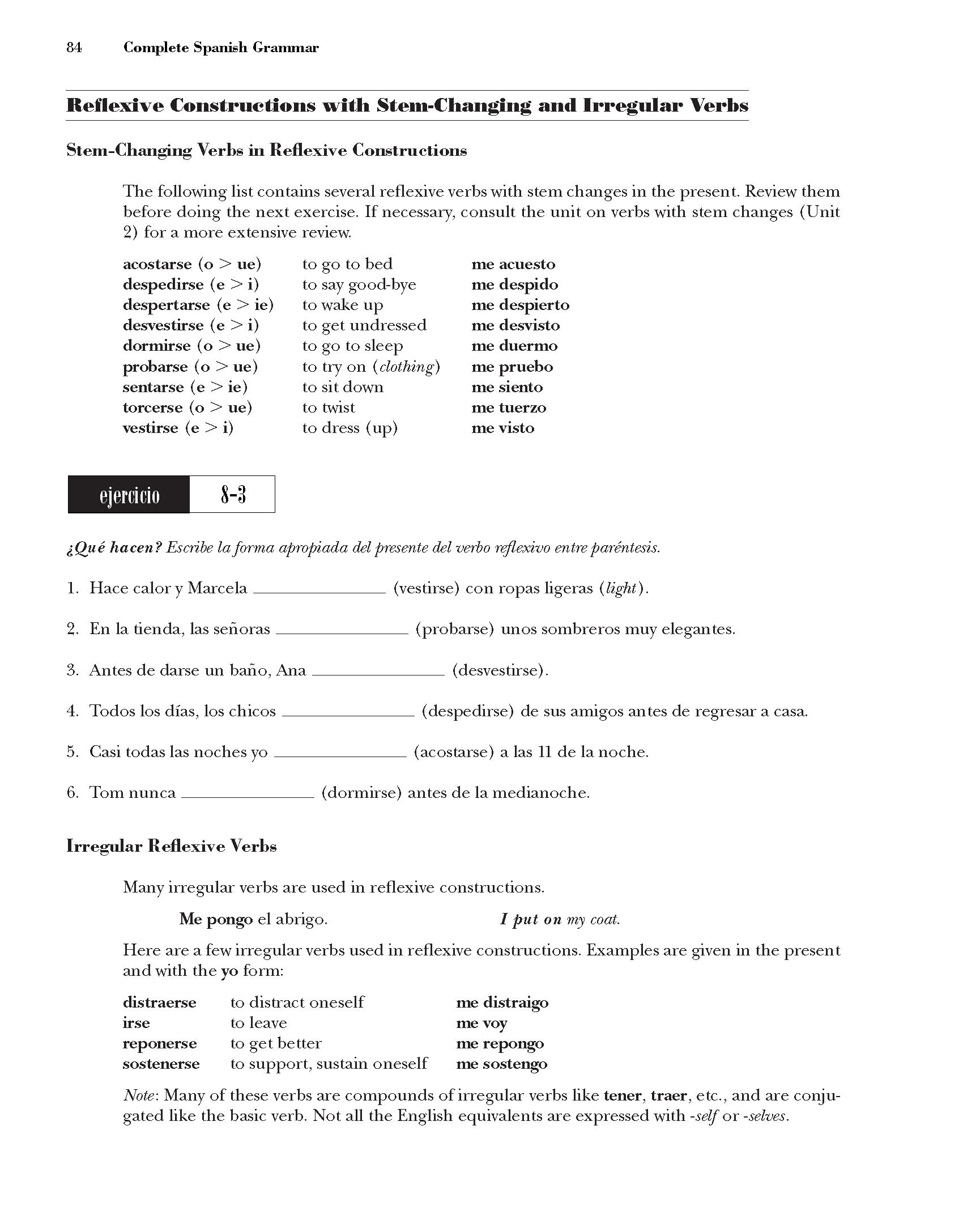CSG095

84
Complete Spanish Grammar
Stem-C11aiigiiig Verbs in Reflexive Constructions
The following list contains several reflexive verbs with stem chan ges in the present. Review them before doing the next exercise. If necessary, consult the unit on verbs with stem changes (Unit 2) for a morę extensive review.
|
acostarse (o > ue) |
to go to bed |
me aeuesto |
|
despedirse (e > i) |
to say good-bye |
me despido |
|
despertarse (e > ie) |
to wake up |
me despierto |
|
desvestirse (e > i) |
to get undressed |
me desvisto |
|
dormirse (o > ue) |
to go to sleep |
me duermo |
|
probarse (o > ue) |
to try on (clothing) |
me pruebo |
|
sentarse (e > ie) |
to sit down |
me siento |
|
torcerse (o > ue) |
to twist |
me tuerzo |
|
yestirse (e > i) |
to dress (up) |
me visto |
lQue ha cen? Escńbe la forma apropiada del presente del verbo reflexivo entre parentesis.
1. Hace calory Marcela_ (vestirse) eon ropas ligeras (light).
2. En la tienda, las seńoras_ (probarse) unos sombreros muy elegantes.
3. Antes de darse un bano, Ana_ (desvestirse).
4. Todos los dias, los chicos
5. Gasi todas las noches yo _
_ (despedirse) de sus amigos antes de regresar a casa. (acostarse) a las 11 de la noche.
6. Tom nunca
(dormirse) antes de la medianoche.
Many irregular verbs are used in reflexive constructions.
Me pongo el abrigo. I put on my coat.
Here are a few irregular verbs used in reflexive constructions. Examples are given in the present and with the yo form:
distraerse
irse
reponerse
sostenerse
to distract oneself me distraigo
to leave me voy
to get better me repongo
to support, sustain oneself me sostengo
Notę: Many of these verbs are compounds of irregular verbs like tener, traer, etc., and are conju-gated like the basie verb. Not all the English equivalents are expressed with -self or -selves.
Wyszukiwarka
Podobne podstrony:
CSG141 130 Complete Spanish GrammarImpersonal Constructions Used to Suhstitute for Passive Construct
CSG207 196 Complete Spanish Grammar • names of rivers, seas, and oceans. El rio Mississippi esta en
CSG039 28 Complete Spanish Grammar Let’s start with a key distinction: ser is used to describe perma
CSG099 88 Complete Spanish GrammarThe Coiiiniands in Reflexlve Construetions In the previous example
CSG039 28 Complete Spanish Grammar Let’s start with a key distinction: ser is used to describe perma
CSG039 28 Complete Spanish Grammar Let’s start with a key distinction: ser is used to describe perma
CSG245 234 Complete Spanish Grammar • With infinitives and the gerundio (-ando, -iendo) forms, prono
więcej podobnych podstron